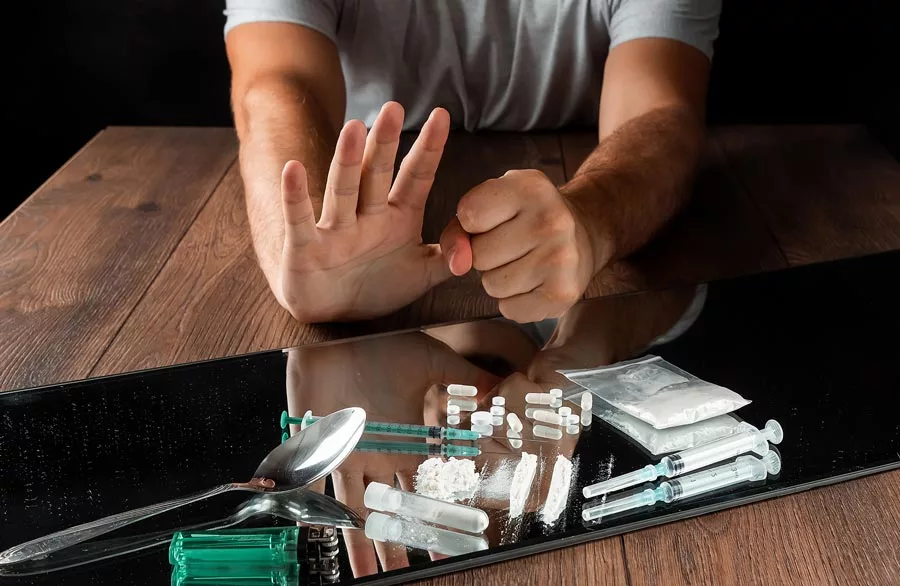About the Signs of a Drug Addict
Information about the signs of a drug addict is critical due to its prevalence in America.
Addiction to drugs is an epidemic that kills thousands of people every year.
Drug addiction transforms and hurts people’s lives all over the globe.
If you think someone you know may be susceptible to drug use or addiction, you must become educated about the signs, symptoms, and treatments for drug addiction.
Though addiction to drugs is hurtful and demanding to maintain, recovery is even more difficult.
Drug addiction changes the brain’s pathways, causing a dependency in the body and compulsive use of the substance.
Even when addiction is hurting them and those they love, someone struggling with an addiction to drugs feels like they have no choice but to continue use.
Learning and memorizing the signs of an addict or the signs of an addictive personality is essential to prevention and recovery.
Having this knowledge allows you to keep an eye out for those you love who you believe may be vulnerable to drug addiction.
MedlinePlus lists the following as signs of a drug addict:
- Changes in appetite
- Loss of interest in favorite things
- Spending a lot of time alone
- Not practicing self-care
- Quick changes in mood
- Being very tired and sad
- Changing friends more than usual
- Having a lot of energy, chattering
- Having issues in work or school
- Having issues with family or friends
Understanding the Signs of a Drug Addict
Knowledge of the signs of a drug addict is constructive, but it is crucial to know the next steps and how addiction occurs if you believe someone you love is suffering from addiction.
Drug addiction can develop both quickly over a short period of time or a slow period of time.
When a person begins using drugs, the effect on the body is intense and sometimes euphoric. Over time, if a person continues usage, the body needs more and more of the substance to produce a high. Addiction forms when the body is dependent on the substance and usage is no longer voluntary. Drug use turns compulsive, and those struggling feel as if they need the substance to survive.
If that person discontinues the use of the drug, the body experiences intense withdrawal symptoms.
Certain people are more susceptible to drug addiction. This information helps prevent drug use and addiction because concerned family members can implement positive drug-avoidance strategies.
MedlinePlus lists the following as risks for drug addiction:
- Individual Biology:
- Some people are less likely to enjoy drug use. If someone tries drugs once and hates them, they are much less likely to form an addiction. Addiction is more common in people who enjoy drug use.
- Mental Health Issues
- Trouble at Home
- Children, adults, and teens who have a difficult home life are more likely to develop a drug addiction.
- Trouble at school, work, or socializing
- Spending time with people who use drugs
- Starting drug use at a young age
If you noticed these symptoms in a friend or a family member, speak to someone responsible and knowledgeable about these concerns. Preventative measures or early interventions help stop addiction from forming.
After addiction forms, it is incredibly challenging to recover from. If you believe you may help someone prevent addiction, acting sooner, rather than later, could save a life.
Immediate Placement in Drug Rehab – Get Help Now
877-651-3366
Effects and Abuse of Drugs
Though it is best to prevent addiction early on, this is not always a possibility. Sometimes, the forming of habit is not an easy thing to see. By the time family members or friends spot the signs of an addict, addiction is already present.
Addiction causes both short and long-term effects on the body and mind. Familiarizing yourself with these effects allows you to help secure treatment for the person you think may struggle with addiction.
The National Institute on Drug Abuse (NIDA) lists the long and short-term risks of drug addiction as follows:
Short-Term Risks:
- Heart attack
- Stroke
- Overdose
- Changes in sleep patterns, mood, heart rate, and appetite
Long-Term Risks:
- Heart or lung disease
- Cancer
- HIV/AIDS
- Hepatitis
- Mental illness
Learn More About Drug Rehab at Best Rehabs In Arizona – Call Today
866-263-1847
Mental Illness and Drug Abuse
Drug abuse and mental illness commonly occur together in the same patient. Drug addiction often leads to mental illness and vice-versa. They are sometimes direct causes of one another, or they can develop together. They may occur together because they affect the same parts of the brain, according to the NIDA. It is also possible for people to turn to drugs because their mental disorder has made them feel upset, anxious, or distracted. Because of these factors, mental illnesses are sometimes signs of an addictive personality.
If mental illness and drug addiction occur together, patients must receive treatment for both issues. The presence of mental illness makes a recovery from drug addiction more difficult if not adequately addressed and treated. It is possible to overcome both mental health issues and drug addiction through treatment.
Common mental health issues to watch out for include:
- Anxiety
- Depression
- ADHD
- Bipolar disorder
24-Hour Drug Rehab Hotline – Get Help Now
877-651-3366
Treatment for the Signs of a Drug Addict
People who display the signs of an addict receive treatment from the expert staff at hospitals or rehabilitation centers. Treating drug addictions is in no way simple; relapse is common, and the body’s compulsive need for the drug makes maintenance of recovery extremely challenging.
Though relapse often occurs and makes recovery much more difficult, it does not mean that treatment has not helped. Recovery is still possible even after multiple relapses.
According to the NIDA, there are three main goals of addiction treatment:
-
- Stopping drug use
- Maintaining a drug-free life
- Becoming or continuing to be a productive member of society
Treatment is adjusted to fit what works best for each patient, so it involves trial and error. Common treatments for the signs of a drug addict include medication, participation in support groups, counseling to diagnose mental health issues, and therapy.
In therapy, patients focus on understanding the reasons they became addicted to drugs in the first place. Therapy also teaches patients how to remain drug-free and avoid relapse.
Support groups provide patients with an essential sense of camaraderie. Being surrounded by understanding people who have experienced similar things has excellent healing potential. Recovery can last a lifetime, so long-term care is sometimes needed to prevent relapse.

Free Insurance Verification for Drug Rehab – Get Help Now
877-651-3366
Payment for Treatment
We know that it is not at all easy to pay for treatment.
Because drug addiction rehabilitation can be expensive, we offer free insurance verification for every client.
Our insurance verification allows you to find out immediately whether your insurance company covers rehab so that you can figure out financing.
Though it is demanding, recovery is possible with the right resources and support networks.
Our dedication is to our patients and their recovery.
Though we cannot guarantee that every patient will recover, our focus always rests on providing the patients with knowledge, care, and compassion to ensure the best recovery chance.
Please do not hesitate to reach out to us if you think you or someone you love displays signs of a drug addict or signs of an addictive personality. We are here to help.




 Doing Your Research Allows You to Explain Why You Need Help for Drugs
Doing Your Research Allows You to Explain Why You Need Help for Drugs Takeaways on Telling Your Family You Need Help for Drugs
Takeaways on Telling Your Family You Need Help for Drugs








